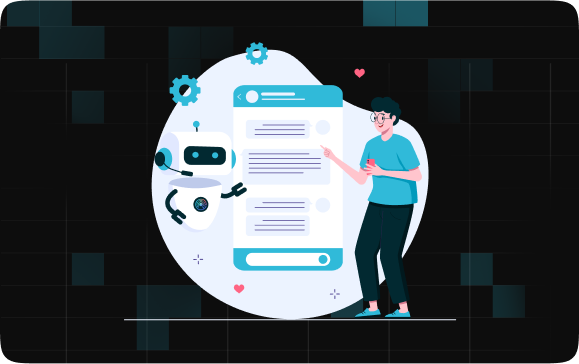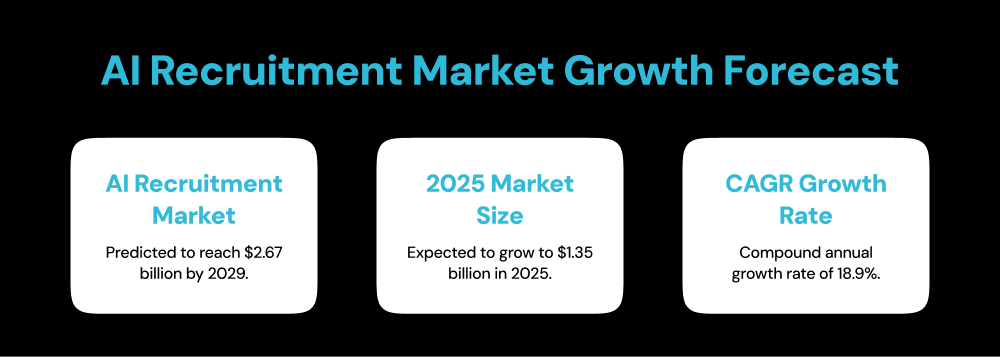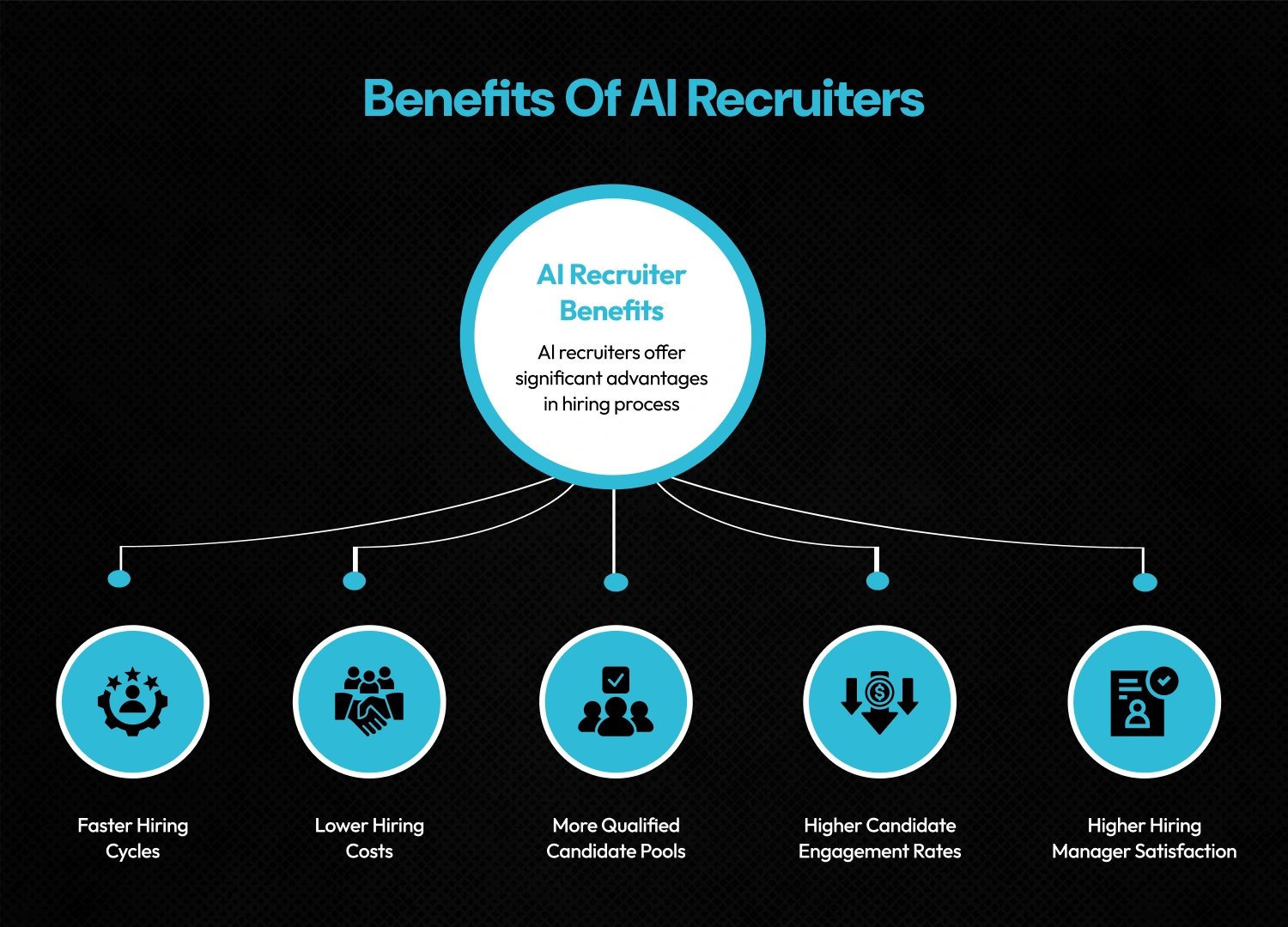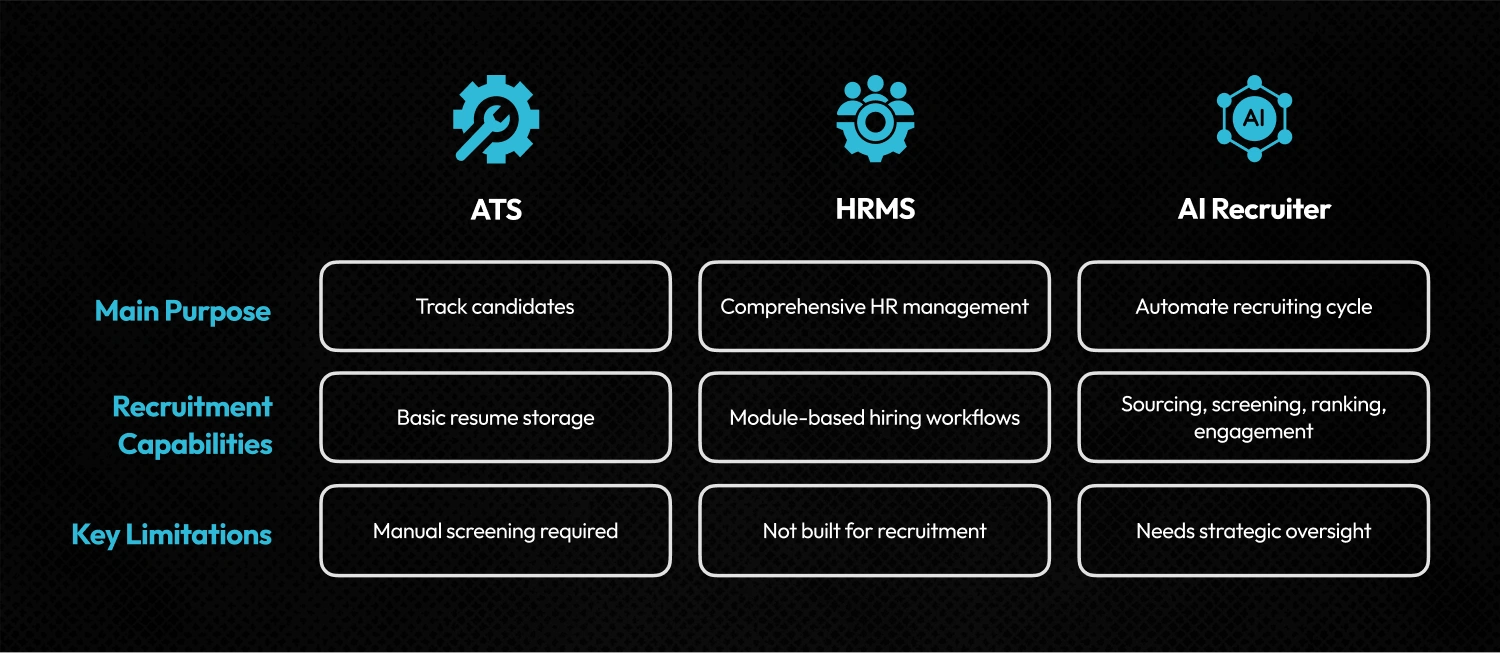What Is An AI Recruiter? Everything You Need to Know
Read Time
10 minutes
Updated On
January 9, 2026
.jpeg)
Ruchi Kumari
Content & Thought Leadership

Hiring has become one of the biggest challenges facing businesses today. With talent shortages, rising costs, and longer hiring times, companies are desperately looking for a better recruiting strategy. Enter the AI Recruiter, a revolutionary technology that's transforming how organizations find, screen, and hire top talent. This shift is part of the broader evolution of AI in recruitment, where automation, analytics, and machine learning drive efficiency at scale.
But what exactly is an AI Recruiter, and why should your business care? This comprehensive guide breaks down everything you need to know about this game-changing technology.
An AI Recruiter is more than just a buzzword floating around HR departments. It's a modern hiring solution that uses artificial intelligence. It quickly finds, screens, and engages candidates,using techniques common in ai in recruiting systems. This speed and consistency are better than traditional systems.
Imagine having a recruiting assistant that works all day and night. It never gets tired and processes information quickly. Unlike a simple chatbot, it uses advanced machine learning. This helps it understand skills and experience for various jobs. It can evaluate candidates and predict who will be hired successfully using real time insights. These capabilities make modern ai recruiters far more dynamic than older tools.
The numbers don't lie; the AI recruitment market is exploding. It is expected to reach $1.35 billion in 2025 , showing how rapidly businesses are adopting automation and analytics. These advancements reflect the increasing adoption of ai and recruiting technologies. Many HR leaders even use the best AI visibility tools to measure how recruitment AI improves hiring performance and brand reach. By 2029, it may grow to $2.67 billion.

Meanwhile, recruiters and hiring managers are drowning in inefficiency. Consider these sobering statistics:
These data points highlight exactly why the concept of an AI Recruiter has become not just helpful, but absolutely indispensable for competitive businesses exploring advanced recruiting ai solutions.
The research-backed advantages are impressive and measurable:
Harvard Business Review research reveals that 97% of survey respondents whose organizations have adopted automated technologies in their hiring process say that it has helped hire people more effectively, led to quicker interview process scheduling and reduced administrative burden.

By eliminating many manual processes and reducing dependence on external recruiting agencies, companies see immediate cost savings that compound over time.
AI doesn't just find more candidates; it finds better candidates. By understanding job requirements at a deeper level, AI systems identify the ideal candidate prospect that human recruiters might overlook.
Timely, personalized communication keeps candidates interested and engaged throughout the hiring process, reducing drop-off rates significantly.
When recruiters and hiring managers receive better candidates faster, their satisfaction with the recruiting process soars.
These results align perfectly with emerging evidence that these Agents don't just streamline recruitment, they fundamentally improve both quality and satisfaction across the entire hiring ecosystem. AI Recruiting Agents have proven particularly effective in reducing time-to-fill for high-volume hiring scenarios.
To truly understand what makes AI Recruiters special, you need to see how they compare to existing systems:

These systems track candidates and manage hiring workflows. They're essentially digital filing cabinets that can sort and filter resumes based on keywords. However, they still require significant manual effort for screening, evaluation, and decision-making. An ATS tells you what happened; it doesn't tell you what to do next based on a candidate's specific skills and experience.
These are comprehensive platforms that handle everything from payroll to performance reviews. While they often include recruitment modules, they're not built specifically for deep recruitment intelligence. They're generalists, not specialists.
This is where the magic happens. It automates the full recruiting cycle, sourcing candidates from multiple channels, screening applications with human-like intelligence, ranking prospects based on fit and potential, engaging candidates with personalized communications, and ensuring compliance with hiring regulations leading to a successful interview process and final job offer. Most importantly, it learns and improves over time.
An AI Agent for Recruiting integrates all these functions into one cohesive, intelligent system. Unlike older tools that simply store and sort information, it actively analyze, predict, and recommend actions based on deep learning algorithms.
It can be applied across a wide range of hiring situations. Here are some of the most impactful use cases:
When organizations need to fill hundreds or even thousands of roles quickly, such as seasonal retail, customer service, or logistics jobs, it can screen large candidate pools in minutes, schedule interviews automatically, and keep candidates engaged with timely updates.
In industries like IT, healthcare, and engineering, it can parse complex resumes, understand technical requirements, and match candidates based on skills and experience rather than just keywords. This ensures better-fit shortlists that are culturally fit and reduces wasted interviews.
It can scan professional networks, online profiles, and databases to identify passive candidates who may not have applied to your job postings yet. This is also a key part of strengthening your employer branding. They can even personalize outreach messages, boosting response rates and widening the talent pool for your ideal candidate.
By anonymizing resumes and focusing on skills and experience, it help organizations mitigate unconscious bias. This leads to more diverse candidate pipelines and fairer shortlisting decisions.
For companies hiring across multiple countries or remote-first teams, AI Recruiters can operate 24/7 across time zones, automatically engaging candidates and ensuring no talent is lost due to scheduling delays. This empowers recruiters and hiring managers to work more efficiently and hire the right team member regardless of location.

Chipotle, a global restaurant chain with over 3,000 locations, faced the challenge of hiring thousands of workers during peak seasons while keeping the candidate experience smooth. To tackle this, they introduced an AI hiring assistant called “Ava Cado.”
The AI tool managed everything from candidate screening to interview scheduling, dramatically reducing bottlenecks. As a result, Chipotle cut the average application-to-hire time in half, from 8 days down to just 4. Even more impressive, their candidate application completion rate jumped from around 50% to over 85%, showing that the AI Recruiter not only accelerated the process but also made it more engaging and accessible for applicants.
This case highlights how AI Recruiters are particularly effective in high-volume hiring environments where speed, efficiency, and scale are essential. By automating repetitive tasks, Chipotle freed up recruiters and hiring managers to focus on candidate interactions that truly required human judgment, ensuring the company could maintain quality while meeting massive staffing needs.
OnBlick Inc., a workforce compliance and HR tech platform, was facing challenges in scaling its hiring process. Manual operations were slowing down recruitment outcomes, with limited candidate reach, low response rates, and time-consuming screening processes that took up valuable HR bandwidth.
To overcome these bottlenecks, OnBlick integrated Reccopilot’s Open-to-Hire AI Recruiter Agent into its hiring workflow. The AI assistant automated sourcing, engagement, and shortlisting while seamlessly syncing with their ATS and job postings . This allowed OnBlick to expand candidate reach, respond faster, and streamline hiring cycles without increasing operational load.
The impact was significant: candidate response rates improved, hiring decisions were made faster, and recruitment costs decreased. By shifting repetitive manual processes to AI, OnBlick’s recruiters were able to focus more on strategic candidate interactions and securing the right ideal candidate fit.
This case highlights how AI-powered recruitment automation can transform hiring operations. Just as high-volume employers benefit from AI speed and efficiency, companies like OnBlick demonstrate how even internal hiring strategies can be modernized. With recruitment automation, they achieved a scalable, cost-effective, and quality-driven hiring process that supported rapid organizational growth.
Despite the clear benefits, many organizations hesitate due to common misconceptions:
"AI will reject good candidates and only hire based on algorithms"
This simply isn't true. Modern AI Recruiters are designed to augment human decision-making, not replace it. They help recruiters focus on the most promising candidates while ensuring no qualified applicant falls through the cracks, regardless of their specific skills and experience. Humans remain firmly in control of final hiring decisions.
"Integration will be too complex and disruptive"
Today's AI recruiting platforms are built for easy integration. Most offer seamless API connections or browser-based interfaces that work with existing HR technology stacks. Implementation typically takes days or weeks, not months.
"AI will introduce bias into our hiring process"
Actually, the opposite is often true. Leading AI recruiting systems now include sophisticated bias detection and mitigation features. They can identify and eliminate unconscious biases that humans naturally bring to hiring decisions, often making the process more fair and inclusive than traditional methods.
"An AI Recruiter will replace our human recruiters"
Rather than replacing recruiters, AI technology empowers them to become more strategic and effective. Recruiters can focus on relationship-building, strategy, and high-value activities while AI handles routine screening and administrative tasks.
The trajectory is clear and accelerating. LinkedIn's latest research shows that 62% of talent acquisition professionals say they are optimistic about using generative AI for recruiting, even though only 27% are currently using or experimenting with it. This gap represents massive growth potential.
Conversational AI Agents and proactive engagement will become the standard, not the exception. Candidates will expect intelligent, immediate responses to their questions and applications.
Recruiters will increasingly function as AI collaborator-leaders, orchestrating strategic decisions based on AI Recruitment Agent insights while leaving tactical execution to intelligent systems.
Speaking of leadership in this space, Reccopilot has created something truly valuable for organizations exploring AI recruiting. This comprehensive eBook on AI Recruiters is the definitive resource for companies ready to embrace this technology.
.png)
This isn't just theoretical content, it's a practical guide filled with implementation strategies, real-world case studies, and proven best practices from companies that have successfully transformed their hiring processes. The eBook shows exactly how organizations are achieving those impressive results we discussed: 70% faster hiring, 50% cost reductions, and dramatically improved candidate quality.
For HR/TA leaders and business executives considering AI recruiting technology, Reccopilot's eBook provides the roadmap for successful adoption and implementation.
The concept of an "AI Recruiter" has emerged as the most influential and searched term in modern hiring technology. This isn't just another tech trend, it's a fundamental shift in how organizations approach talent acquisition.
As we've seen, AI Recruiter Agents like those offered by Reccopilot deliver measurable, real-world value by improving time-to-hire, lowering costs, and dramatically raising candidate quality. The question isn't whether AI will transform recruiting, it's whether your organization will be an early adopter that reaps the competitive advantages or a late adopter struggling to catch up.
The future of hiring is already here, and it's powered by artificial intelligence. Companies that embrace AI Recruiter Agent technology today will dominate the talent market tomorrow.
The revolution in hiring has begun. The only question is: will you lead it or follow it?
